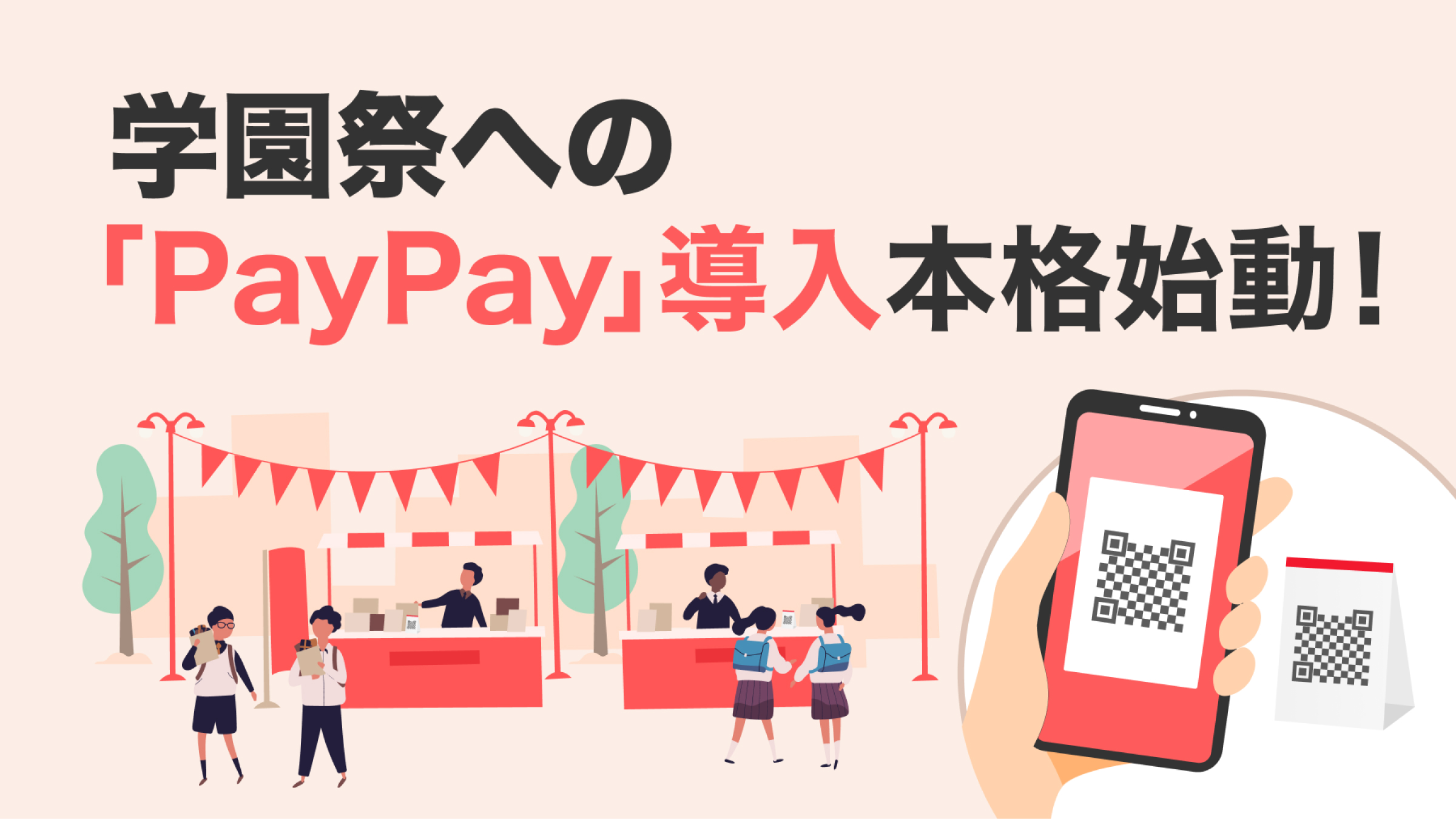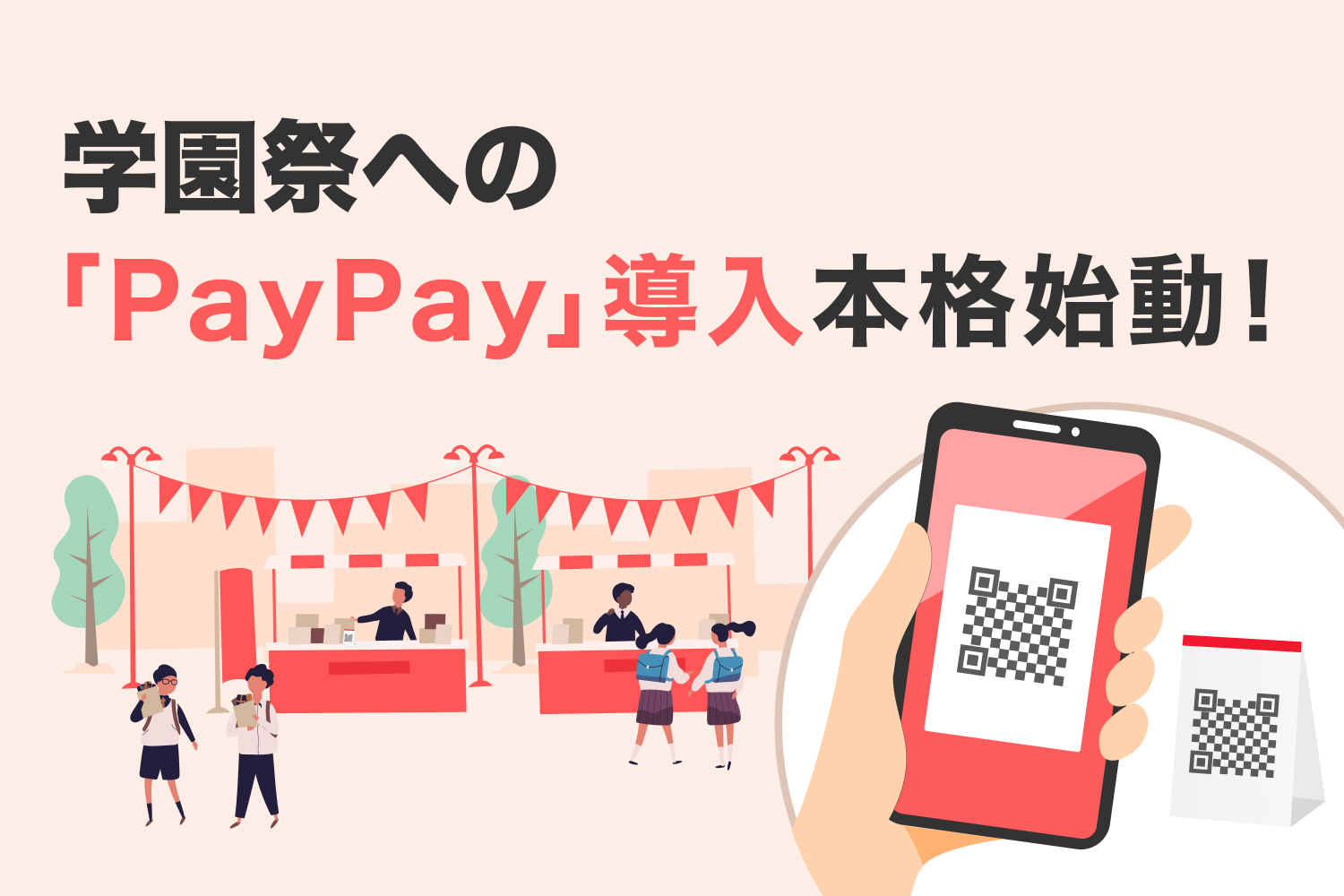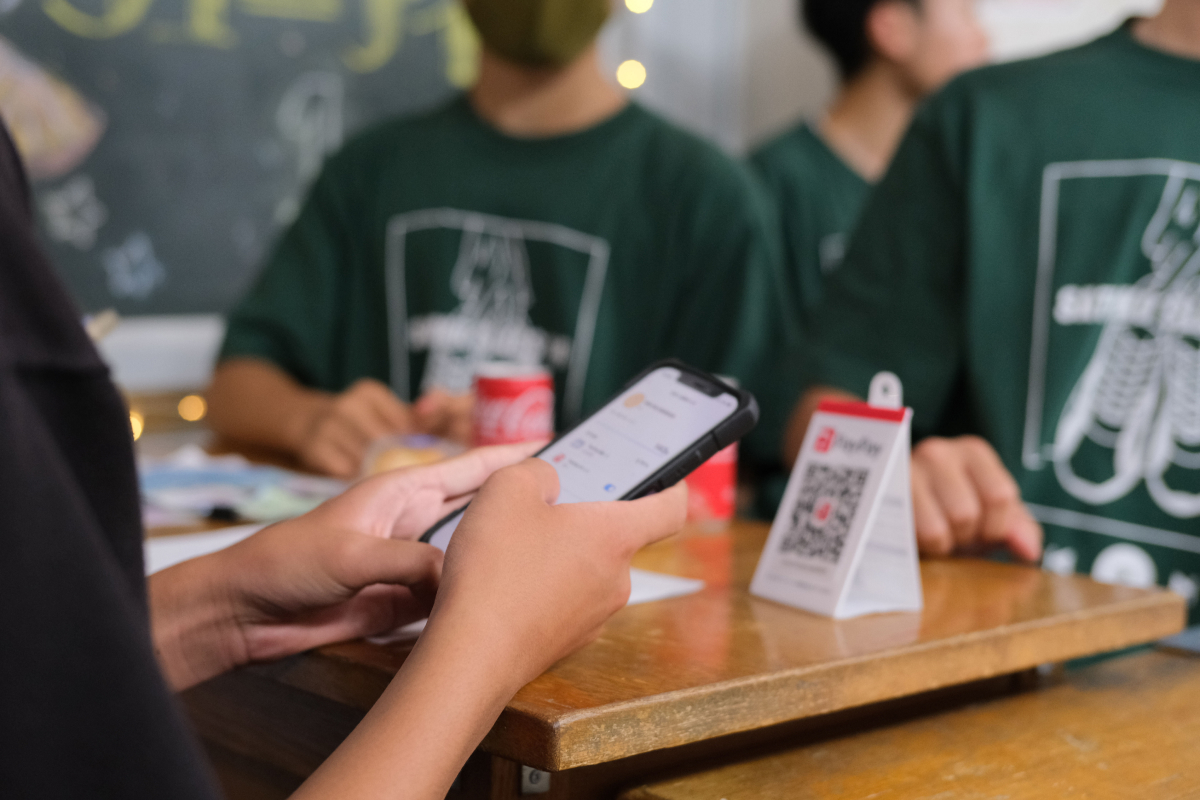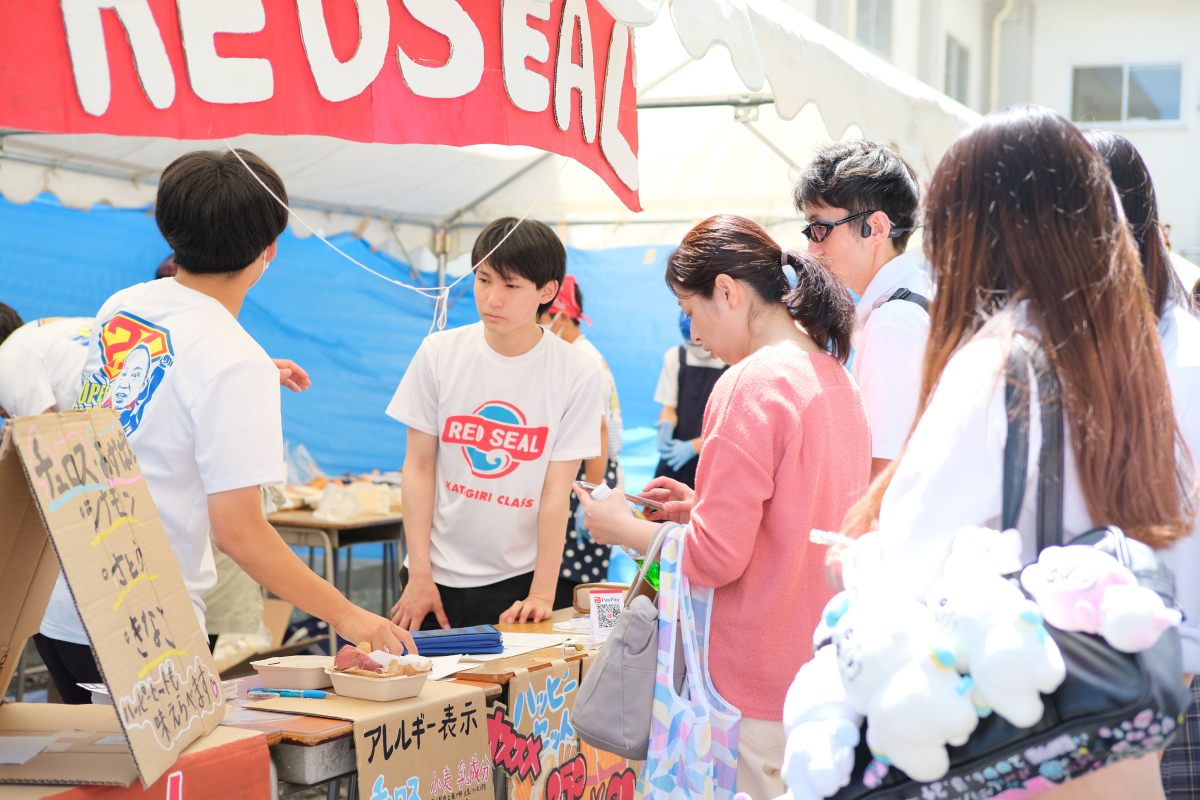PayPay Corporation(hereinafter, PayPay) has officially commenced activities for the full-scale introduction of its cashless payment service “PayPay,” to school festivals across the nation. Notably, “PayPay” was introduced at the school festival of Kanagawa Prefectural Yokosuka High School, held on Saturday, June 22, and Sunday, June 23, 2024. This marks the first instance of such an introduction for school festivals in the 2024 academic year.


PayPay has previously implemented measures to expand its user base among the youth through initiatives such as the “New Year’s Gift Lottery” and region-specific “Extra Pocket Money Campaign,” focusing on remittances. Additionally, PayPay has strengthened its presence in popular online shopping sites and schools, including those favored by the younger generation and teenagers. Since 2023, PayPay has extended its service provision from private schools and universities, where it was already introduced, to public schools(elementary, junior high, and high schools). Consequently, “PayPay” can now be used for various in-school purchases, including school festivals, club activity fees, and school meals in public schools. In the 2023 academic year, PayPay was introduced to the school festivals of approximately 20 schools, primarily through inquiries received from the schools. Feedback from students and school staff highlighted the convenience of not needing to prepare change, fewer payment errors, and faster, more convenient transactions.
Considering this background and the demands from schools nationwide, PayPay will strengthen its sales efforts in the 2024 academic year and work towards enabling the use of “PayPay” in nearly twice as many schools and universities as last year.
Furthermore, as financial education becomes mandatory in high schools nationwide from 2022, PayPay Securities Corporation, a group company, conducts outreach classes on financial education for young people, including high school students. These classes cover topics such as managing money, including cashless transactions, financial troubles, household expenses management, and asset management. By introducing “PayPay” to school festivals as part of financial education, it is expected to deepen understanding of cashless payments, provide practical economic activity experience, reduce the burden and risk of cash management for students and school staff, and improve convenience. The PayPay group will continue to contribute to enhancing financial literacy among the youth.
■ Report of the Kanagawa Prefectural Yokosuka High School Festival
The school festival was conducted entirely cashless, using only “PayPay”*1 to eliminate the need for preparing change and the risks associated with cash management. There was no confusion on the day, as many attendees were already using “PayPay,” and the festival executive committee had announced the registration process in advance. Feedback from students, teachers, and visitors were positive, mentioning the benefits of quick payments, efficiency of not having to handle change, and learning about how to use cashless payments.
※1 Non-PayPay users made payments using pre-purchased vouchers.


<Introduction of “PayPay” to Schools and Universities>
■ Availability of PayPay Payments
| Available(※2) | Not available |
|---|---|
| ・School festivals ・In-school purchase fees, including club activity fees and school meal fees |
・Donations |
※2 An examination of the intended use and other factors by the company will be conducted at the time of application.
■ Application and Contract
Private Schools(Elementary, Junior High, High Schools), Universities(※3)
Contracting Entity: The president or chairperson of an organization with legal personality and decision-making authority
※3 For affiliated schools, please apply through the parent school with legal personality.
Public Schools(Elementary, Junior High, High Schools)
Contracting Entity: Varies depending on the accounting category of the items to be settled (※4)
– For private accounting: School principal
– For public accounting: Local government
※4 The distinction between private and public accounting varies by local government. Please confirm with the local government if unclear.
Others
As of June 2024, contracts cannot be made with PTAs, alumni associations, clubs, or executive committees.
■ Inquiries Regarding the Introduction of “PayPay” by School Personnel
School personnel can make inquiries through the following link.
https://merchant.paypay.ne.jp/webform/?Inquiry_Number=SchoolFestivalForm
■ About “PayPay”, the cashless payment service provided by PayPay Corporation
PayPay is a cashless payment service expanding across the country, available not only at major chain stores but also at small and medium size retailers, vending machines, taxis, and even public transportation. It can also be used in a variety of other situations, including paying for online services and utility bills. PayPay is also expanding its range of services beyond just payments, including a “send/receive” feature(remittance/transfer and receiving of money)that allows users to transfer their PayPay Balance(PayPay Money and PayPay Money Lite)between each other for free, or “point management,” a service that allows users access to a simulated investment experience involving the exchange of PayPay Points with points provided by a service provider that PayPay is partnered with. The company also strives to create a safe and convenient environment for users through a hotline available 24/7 and a full compensation scheme ensuring, compensation for any damages that may be suffered.
PayPay is registered as follows:
・Prepaid Payment Instruments(third party type)Issuer(Registration number: Director-General of the Kanto Finance Bureau, No. 00710/Registration date: October 5, 2018)
・Business Operator that Concludes Contracts on the Handling of Credit Cards(Registration number: Kanto(Ku)No. 106/Registration date: July 1, 2019)
・Telecommunications Carrier(Filing number: A-02-17943/Date filed: July 2, 2019)
・Fund Transfer Operator(Registration number: Director-General of the Kanto Finance Bureau, No. 00068/Registration date: September 25, 2019)
・Notified Entity Entrusted with Intermediation(Filing number: C1907980/Date filed: December 18, 2019)
・Bank Agency Services(License: Director-General of the Kanto Finance Bureau(Gindai)No. 396/Registration date: November 26, 2020)
・Financial Instruments Intermediary Services(Registration number: Kanto Finance Bureau Director(Kinchu)No. 942/Registration date: June 25, 2021)
・Electronic Payment Agency Services(License: Director-General of the Kanto Finance Bureau(Dendai)No. 109/Registration date: February 14, 2023)
・Japan Payment Service Association(https://www.s-kessai.jp/, Date of admission: September 12, 2018)
・Japan Consumer Credit Association(https://www.j-credit.or.jp/, Date of admission: July 1, 2019)
※ “PayPay” provides 3 types of PayPay balance: PayPay Money, PayPay Money Lite, and Gift Vouchers.
PayPay Money can be used to pay for partner services and merchants if it is within the amount deposited into the PayPay account opened after completing an identity verification process. It can also be used for sending and receiving money between PayPay users free of charge. PayPay Money can also be cashed out to a designated bank account(no withdrawal fee if using PayPay Bank). The legal nature of this is an electromagnetic record which can be used to pay for goods and services, can be remitted or cashed out, and is issued by PayPay who is a Fund Transfer Operator registered under Article 37 of the Payment Services Act. Based on the provisions of Article 43 of the Payment Services Act, PayPay protects the debt it owes to its users by depositing assets equivalent to or higher than the debt amount. PayPay Money Lite is an electronic money issued by PayPay, which can be purchased and used to pay for services and merchants. PayPay users can transfer and receive PayPay Money Lite free of charge. The legal nature of this is a prepaid payment instrument issued by PayPay(Article 3, Paragraph 1 of the Payment Services Act). Based on the provisions of Article 14 of the Payment Services Act, PayPay preserves the relevant assets for the purpose of protecting the owners of the prepaid payment instrument by providing a security deposit for issuance to the Legal Affairs Bureau in an amount that is half or more of the unused balance of prepaid instrument methods as of March 31 and September 30. In addition, PayPay Points, which are granted through campaigns and promotions when using PayPay, can be used for partner services and in transactions at merchants in addition to PayPay Money and PayPay Money Lite. However, PayPay Points cannot be sent or transferred between PayPay users or be cashed out. PayPay Gift Voucher is a type of electronic money issued by PayPay, which can be used to make payments for affiliated services and merchants designated by the PayPay Gift Voucher. However, it cannot be transferred to other users or cashed out. PayPay Gift Vouchers have an expiration date, after which they will no longer be valid. The deadline for Gift Vouchers can be confirmed in the details or specifications of the measure or promotion campaigns for which they are issued.
PayPay also strives to create a safe and secure environment for users. If an unexpected payment is made by a third party using a PayPay account, or if a request to settle a payment suddenly arrives from PayPay to a user that does not have a PayPay account, there is a scheme that ensures compensation for the damages suffered(the difference will be provided as compensation if compensation is also provided by a third party), given that the prescribed conditions are met. Please see “Applying for compensation“for details.
※ Company names, trade names, and products/services in this press release are registered trademarks or trademarks of their respective companies.





